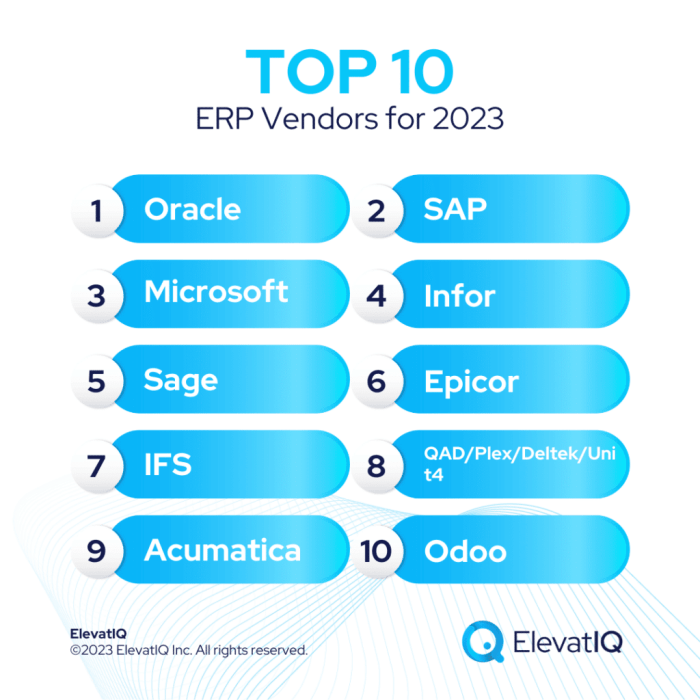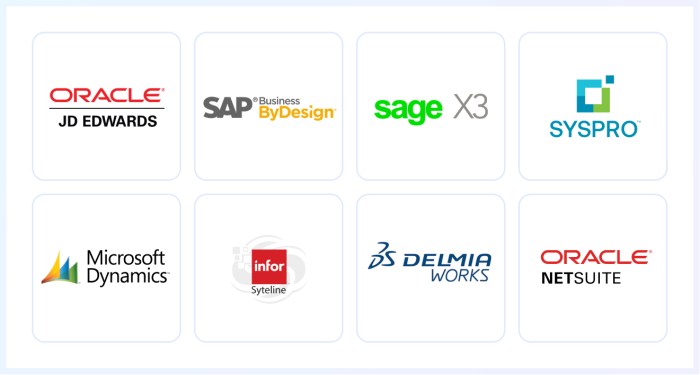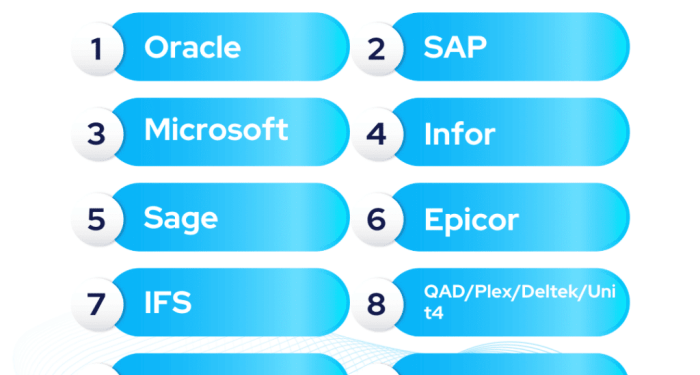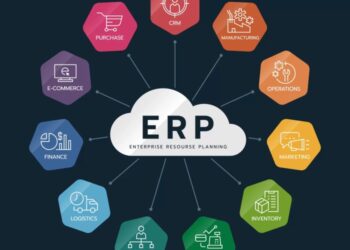Diving into the realm of top ERP vendors, this introduction sets the stage for an insightful journey into the world of enterprise resource planning systems. Discover the key players, features, challenges, and more as we delve into this dynamic landscape.
In this exploration, we will uncover the essentials of ERP systems, the significance of choosing the right vendor, and how businesses can benefit from aligning their requirements with top ERP solutions.
Overview of Top ERP Vendors
Enterprise Resource Planning (ERP) systems are software solutions that help organizations manage and integrate their core business processes such as finance, HR, supply chain, and more. These systems streamline operations, improve efficiency, and provide valuable insights for decision-making.
Some of the top ERP vendors in the market include:
SAP
- SAP is a global leader in ERP software, offering solutions for businesses of all sizes across various industries.
- Their ERP software helps organizations optimize processes, enhance collaboration, and drive innovation.
Oracle
- Oracle is another major player in the ERP market, providing a wide range of solutions tailored to different business needs.
- Their ERP software focuses on scalability, flexibility, and advanced analytics capabilities.
Microsoft Dynamics 365
- Microsoft offers a comprehensive suite of ERP solutions under Dynamics 365, designed to help businesses improve productivity and customer engagement.
- Their ERP software integrates seamlessly with other Microsoft products for a holistic business management approach.
Choosing the right ERP vendor is crucial for a business as it can significantly impact operations, growth, and overall success. The right ERP system can streamline processes, increase efficiency, and provide valuable insights to drive strategic decision-making. It's essential to evaluate vendors based on factors such as industry expertise, scalability, customization options, support services, and pricing to ensure the chosen solution aligns with the organization's goals and requirements.
Features and Capabilities
When it comes to top ERP vendors, each one offers a unique set of features and capabilities designed to streamline business operations and improve efficiency. Let's explore some of the key features they provide and how these align with the diverse requirements of businesses.
Integration of Business Processes
ERP systems from top vendors like SAP, Oracle, and Microsoft Dynamics offer robust capabilities for integrating various business processes. This includes modules for finance, HR, supply chain management, and customer relationship management. The seamless integration of these processes helps organizations achieve better visibility and control over their operations.
Scalability and Customization
One of the defining features of top ERP vendors is the scalability and customization options they provide. Whether a business is small or large, ERP systems can be tailored to meet specific needs. Vendors like Infor and Epicor offer flexible solutions that can adapt to the changing requirements of a growing business.
Data Analytics and Reporting
Modern ERP systems come equipped with advanced analytics and reporting tools that enable businesses to derive valuable insights from their data. Vendors such as Sage and NetSuite offer powerful reporting capabilities that help businesses make informed decisions based on real-time data.
Mobile Accessibility
In today's fast-paced business environment, mobile accessibility is essential. Top ERP vendors like Acumatica and IFS provide mobile applications that allow employees to access important data and perform tasks on the go. This enhances productivity and efficiency, especially for remote or field workers.
Cloud-Based Solutions
Cloud-based ERP solutions are becoming increasingly popular due to their flexibility and cost-effectiveness. Vendors like Workday and Plex offer cloud-based ERP systems that enable businesses to access their data securely from anywhere, at any time. This also reduces the need for extensive IT infrastructure and maintenance costs.
Implementation Process

When it comes to implementing ERP systems, vendors typically follow a structured process to ensure a successful deployment. This process involves various steps and stages that are crucial for integrating the ERP software into a company's operations seamlessly.
Initial Assessment and Planning
During this stage, the ERP vendor works closely with the client to understand their business processes, goals, and requirements. This involves conducting a detailed assessment of the current systems in place and identifying areas that need improvement. The vendor then creates a comprehensive implementation plan that Artikels the scope, timeline, and resources required for the project.
Configuration and Customization
Once the planning phase is complete, the ERP system is configured and customized to meet the specific needs of the client. This may involve tailoring the software to align with the company's workflows, data structures, and reporting requirements. The vendor ensures that the system is set up correctly and tested thoroughly before moving on to the next phase.
Data Migration and Integration
Data migration is a critical step in the implementation process, as it involves transferring existing data from legacy systems to the new ERP platform. The vendor ensures that data is cleansed, validated, and migrated accurately to avoid any discrepancies or errors.
Integration with other systems, such as CRM or HR software, is also performed to ensure seamless data flow across the organization.
User Training and Testing
Before the ERP system goes live, the vendor provides comprehensive training to the users to familiarize them with the new software. This training helps employees understand how to navigate the system, input data, and generate reports effectively. Additionally, extensive testing is conducted to identify and resolve any bugs or issues before the system is fully operational.
Go-Live and Support
Once the system is tested and all users are trained, the ERP software is officially launched, and the company transitions to using the new system in their day-to-day operations. The vendor provides ongoing support and maintenance to address any issues that may arise post-implementation, ensuring a smooth transition and optimal performance of the ERP system.
Challenges During ERP Implementation
- Resistance to change from employees who are accustomed to legacy systems.
- Data quality issues during the migration process.
- Unrealistic timeline or budget constraints.
- Lack of executive buy-in and support for the project.
- Poor communication and collaboration between the vendor and the client.
Best Practices for Successful ERP Implementation
- Engage stakeholders early in the process to ensure alignment with business goals.
- Conduct thorough training sessions for all users to promote adoption and usage.
- Define clear project scope, timeline, and milestones to track progress.
- Establish a dedicated project team with representatives from both the vendor and the client.
- Regularly communicate and provide updates on the implementation progress to all stakeholders.
Customer Support and Service

Customer support plays a crucial role in the overall satisfaction and success of an ERP implementation. Having access to reliable and responsive customer service can make a significant difference in resolving issues quickly and ensuring the system operates smoothly.
Comparison of Customer Service Offerings
- SAP: SAP offers a range of support options, including phone, email, and chat support. They also provide a knowledge base and online community forums for users to find answers to common questions.
- Oracle: Oracle provides 24/7 global support through phone, email, and online chat. They offer personalized support plans based on the specific needs of the organization.
- Microsoft Dynamics 365: Microsoft offers support through phone, email, and online chat. They also provide access to a customer portal with resources and training materials.
Exceptional Customer Service Experiences
One customer shared their experience with Oracle's customer support, praising the quick response time and knowledgeable support staff who helped resolve a critical issue during a system upgrade.
Another user highlighted SAP's customer support for going above and beyond to address their concerns, providing personalized assistance and guidance throughout the implementation process.
Pricing Models
When it comes to pricing models for ERP vendors, there is a wide range of options available that cater to different business sizes and industries. Understanding the pricing structures and potential hidden costs is crucial in selecting the right ERP solution for your organization.
Variability in Pricing Structures
- Some ERP vendors offer tiered pricing based on the size of the business, with different features and capabilities included in each tier.
- Others may offer a subscription-based model where you pay a monthly or annual fee for access to the software.
- There are also vendors who charge based on the number of users accessing the ERP system, which can result in higher costs for larger organizations.
Hidden Costs to Consider
- Implementation costs: While the software itself may have a set price, the implementation process can incur additional costs for training, customization, and integration with existing systems.
- Support and maintenance fees: Some vendors charge ongoing fees for technical support, updates, and maintenance of the ERP system.
- Licensing fees: Depending on the vendor, you may need to pay for additional licenses as your business grows or if you require access for more users.
- Customization costs: Tailoring the ERP system to meet your specific business needs can result in additional expenses that should be factored into your budget.
Integration Capabilities
In today's interconnected business environment, the ability of ERP systems to seamlessly integrate with other software solutions is crucial for maximizing efficiency and productivity.ERP vendors offer a variety of integration capabilities to ensure smooth communication between different systems within an organization.
These integrations can range from basic data transfers to more complex connections that enable real-time synchronization of information.
API Integration
- Many top ERP vendors provide robust API integration capabilities, allowing businesses to connect their ERP system with a wide range of third-party applications and services.
- API integrations enable data sharing, automation of processes, and the creation of custom workflows tailored to the specific needs of the organization.
- For example, a company may integrate its ERP system with a CRM platform to streamline sales and customer management processes, ensuring consistent and up-to-date information across both systems.
Legacy System Integration
- ERP vendors also offer tools and services for integrating with legacy systems, allowing businesses to leverage their existing software investments while transitioning to a modern ERP solution.
- Integration with legacy systems helps organizations avoid data silos and ensures a smooth migration process without disrupting critical operations.
- For instance, a manufacturing company may integrate its legacy production planning software with a new ERP system to improve inventory management and production efficiency.
Cloud Integration
- Top ERP vendors often provide cloud integration capabilities, enabling organizations to connect their ERP system with cloud-based applications and services for enhanced flexibility and scalability.
- Cloud integrations allow businesses to access data and resources from anywhere, facilitating remote work and collaboration among employees.
- For example, a retail company may integrate its ERP system with a cloud-based e-commerce platform to synchronize inventory levels, orders, and customer data in real time.
Last Recap
In conclusion, the discussion on top ERP vendors sheds light on the vital role they play in modern business operations. By understanding their features, implementation process, customer support, pricing models, and integration capabilities, businesses can make informed decisions to propel their growth and efficiency.
FAQ Overview
What factors should businesses consider when choosing an ERP vendor?
Businesses should consider factors such as scalability, customization options, industry-specific features, integration capabilities, and customer support when selecting an ERP vendor.
How can businesses ensure a successful ERP implementation?
Businesses can ensure a successful ERP implementation by conducting thorough training for employees, aligning the system with business processes, setting clear goals, and regularly monitoring the implementation progress.
Are there any hidden costs associated with ERP vendors?
Yes, hidden costs such as additional modules, customization fees, data migration charges, and ongoing support costs should be considered when evaluating ERP vendors.
What are some common challenges during ERP implementation?
Common challenges during ERP implementation include resistance from employees, data migration issues, system integration complexities, and disruptions to daily operations.








![Best Construction ERP Software [2024 Edition]](https://health.bandungnews.id/wp-content/uploads/2025/10/Top-10-Best-Construction-ERP-Software-to-Use-in-2024-1-120x86.jpg)



